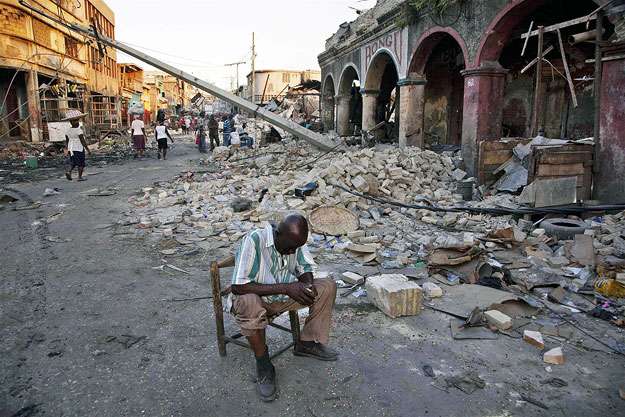Nem tétlenkedik a hazánkban is igen aktív Nemzetközi Valutaalap (IMF): a földrengés sújtotta Haiti adósságából elengedett 268 millió dollárt. Egyszersmind 60 millió dollár körüli hitelt nyújt az országnak és 109 millió eurósat Koszovónak.
A Nemzetközi Valutaalap (IMF), csütörtöki bejelentése szerint leírja Haiti 268 millió dolláros adósságát, és további 60 millió dollár hitelt nyújt az újjáépítésre. A 3 éves futamidejű hitelnek 2011-ig nincs kamata, és ezt követően sem emelkedhet a kamat 0,5 százalék fölé.
A humanitárius segélyre a világ országai által ígért 3,1 milliárd dollárt főként a segélyek célba juttatására, egészségügyi célokra, a sebesülteket ellátó kórházak fenntartására, valamint a működtető személyzetek bérére fordították.
Az ezen felül a márciusi donorkonferencián beígért 9,9 milliárd dollárnak ugyanakkor csak 2 százalékát folyósították eddig a donorországok. A konferencián több mint 60 ország ígért segítséget. Haitit az idén januárban sújtotta mintegy háromszázezer halálos áldozatot követelő földrengés, amelynek nyomán 1,5 millióan váltak földönfutóvá.
Eközben Koszovóval pedig másfél évre szóló, 108,9 millió eurós hitelmegállapodást kötöttek. Az első, 22,1 milliós részlethez Pristina azonnal hozzájut, az összeg fennmaradó részét az időszakos felülvizsgálatok függvényében veheti fel.
A Koszovónak nyújtott készenléti hitel az államháztartás stabilizálására hozott intézkedések megvalósítását szolgálja. A közkiadások az első koszovói autópálya tervezett megépítése miatt emelkednek az idén.
Koszovót kevéssé érintette a gazdasági válság, bruttó hazai terméke (GDP) 4 százalékkal nőtt tavaly. 2008-ban 5,4 százalékos volt a gazdasági növekedés.
Koszovót - amely 2008 februárban nyilvánította ki függetlenségét - tavaly júniusban 186. tagjaként vette fel az IMF. 1999. június és 2008. február között az egykori szerbiai tartomány az ENSZ igazgatása alatt állt.
On 20 January, a man sits in front of his store, amid the destruction caused by the earthquake, in a commercial area in Port-au-Prince, the capital.
On 25 January 2010 in Haiti, humanitarian assistance for survivors of the 7.3 magnitude earthquake that hit the country on 12 January continues to improve as capacity and logistical constraints are addressed. The quake�s epicentre was only 17 kilometres from Port-au-Prince, the capital, and needs remain great. Quake aftershocks on 20 and 23 January caused further damage, especially in the town of Petit Goave. Unaccompanied children who have lost or been separated from their families are among the most vulnerable. Revised estimates by the Government report that more than 112,000 people were killed during the quake and 1.5 million have been left homeless. In Port-au-Prince, estimated numbers of people living in makeshift shelters range from 370,000�800,000, despite the recent exodus of as many as 235,000 from the devastated city. Major government and private infrastructure have been destroyed or heavily damaged, including hospitals, water, sanitation and electrical systems, and telecommunications, banks and transportation networks. United Nations and UNICEF buildings and residences were also hit, and UN staff and peacekeepers with the UN Stabilization Mission in Haiti (MINUSTAH) are missing and more than 50 are confirmed to have died. MINUSTAH, totalling 7,000 peacekeepers and 2,000 police, have relocated their logistics base close to the airport to better coordinate incoming international relief assistance. The UN Consolidated Flash Appeal for the Haiti earthquake emergency requests US $575 million for relief and recovery for the next six months. UNICEF�s portion of the appeal is US $127.9 million and UNICEF is the lead coordinating agency for education, child protection, nutrition and WASH (water, sanitation and hygiene). Working with the Government, other UN agencies, international and local NGOs and private partners, UNICEF is distributing safe water and equipment and health and shelter supplies, and establishing child feeding centres for children under age five. UNICEF is also working with partners to establish �safe spaces� for unaccompanied children and implementing procedures to identify, register and help reunite them with their families. Support has also been given to the Government to monitor children who are departing the country, to ensure that proper documentation and permissions are in place. This latest catastrophe exacerbates Haiti�s already critical humanitarian situation. An estimated 46 per cent of its nearly 10 million inhabitants are under age 18, and more than 78 per cent of the population lives on less than US $2.00 a day.


